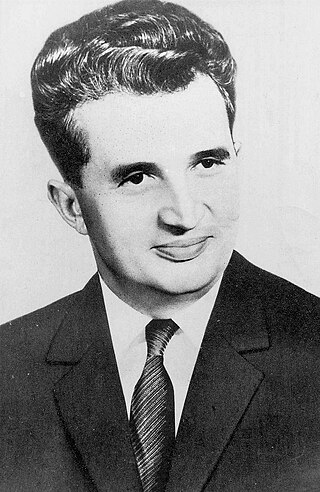
Nicolae Ceaușescu was a Romanian politician who was the second and last communist leader of Romania, serving as the general secretary of the Romanian Communist Party from 1965 to 1989. Widely classified as a dictator, he was the country's head of state from 1967 to 1989, serving as President of the State Council from 1967 and as the first President of the Republic from 1974. He was overthrown and executed in the Romanian Revolution in December 1989 along with his wife Elena Ceaușescu, as part of a series of anti-communist uprisings in Eastern Europe that year.
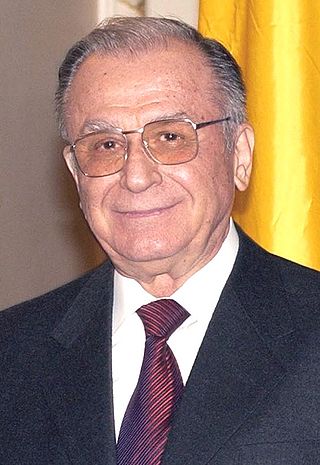
Ion Iliescu is a Romanian politician and engineer who served as the second and fourth president of Romania from 1989 until 1996 and from 2000 until 2004. Between 1996 and 2000 and also from 2004 to 2008, the year in which he retired, Iliescu was a senator for the Social Democratic Party (PSD), of which he is the founder and honorary president to this day.

The president of Romania is the head of state of Romania. They are directly elected by a two-round system, and, following a modification to the Romanian Constitution in 2003, serve for five years. An individual may serve two terms that may be consecutive. During their term in office, the president may not be a formal member of a political party. The president of Romania is the supreme commander of the Romanian Armed Forces.

The Socialist Republic of Romania was a Marxist–Leninist one-party socialist state that existed officially in Romania from 1947 to 1989. From 1947 to 1965, the state was known as the Romanian People's Republic. The country was an Eastern Bloc state and a member of the Warsaw Pact with a dominant role for the Romanian Communist Party enshrined in its constitutions. Geographically, RSR was bordered by the Black Sea to the east, the Soviet Union to the north and east, Hungary and Yugoslavia to the west, and Bulgaria to the south.
After the Communist rulership ended and the former Communist dictator Nicolae Ceaușescu was executed in the midst of the bloody Romanian Revolution of December 1989, the National Salvation Front (FSN) seized power, led by Ion Iliescu. The FSN transformed itself into a massive political party in short time and overwhelmingly won the general election of May 1990, with Iliescu as president. These first months of 1990 were marked by violent protests and counter-protests, involving most notably the tremendously violent and brutal coal miners of the Jiu Valley which were called by Iliescu himself and the FSN to crush peaceful protesters in the University Square in Bucharest.

The Romanian revolution was a period of violent civil unrest in Romania during December 1989 as a part of the revolutions of 1989 that occurred in several countries around the world, primarily within the Eastern Bloc. The Romanian revolution started in the city of Timișoara and soon spread throughout the country, ultimately culminating in the drumhead trial and execution of longtime Romanian Communist Party (PCR) General Secretary Nicolae Ceaușescu and his wife Elena, and the end of 42 years of Communist rule in Romania. It was also the last removal of a Marxist–Leninist government in a Warsaw Pact country during the events of 1989, and the only one that violently overthrew a country's leadership and executed its leader; according to estimates, over one thousand people died and thousands more were injured.

General elections were held in Romania on 20 May 1990 to elect the President and members of Parliament. They were the first elections held after the overthrow of the communist regime six months earlier and the first free elections held in the country since 1937. It was also the first time the president had been directly elected, the position having been previously elected by the legislature since it was introduced in 1974.

The Senate is the upper house in the bicameral Parliament of Romania. It has 136 seats, to which members are elected by direct popular vote using party-list proportional representation in 43 electoral districts, to serve four-year terms.

The National Salvation Front was the most important political organization formed during the Romanian Revolution in December 1989, which became the governing body of Romania in the first weeks after the collapse of the communist regime. It subsequently became a political party, the largest post-communist party, and won the 1990 election with 66% of the national vote, under the leadership of then-President Ion Iliescu, who was elected with 85% of the vote.
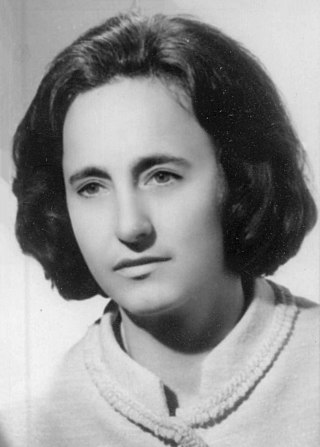
Elena Ceaușescu was a Romanian communist politician who was the wife of Nicolae Ceaușescu, General Secretary of the Romanian Communist Party and leader of the Socialist Republic of Romania. She was also the Deputy Prime Minister of Romania. Following the Romanian Revolution in 1989, she was executed alongside her husband on 25 December.
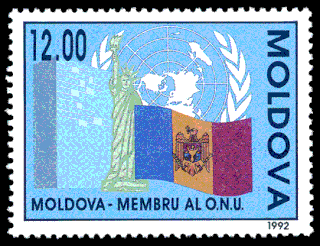
The following is timeline of the History of independent Moldova which started after the independence of Moldova.
Simion Bughici was a Romanian communist politician who served as the Minister of Foreign Affairs of Romania.
Parliamentary elections were held in Romania on 17 March 1985. The Front of Socialist Unity and Democracy (FDUS), dominated by the Romanian Communist Party (PCR) and including other mass organisations, was the only group to contest the elections, and no prospective candidate could run for office without the Front's approval. Consequently, FDUS candidates won all 369 seats in the Great National Assembly, also ensuring the rubber-stamp confirmation of Nicolae Ceaușescu as President of Romania. The Assembly which elected him included several members of the Ceaușescu family, namely his wife Elena, son Nicu, and brother Ilie. Continuity was also ensured by other incumbents, including Nicolae Giosan as Assembly chairman and Constantin Dăscălescu as Prime Minister.
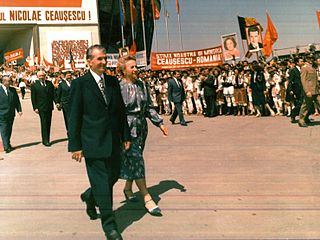
During the Cold War, Romanian dictator Nicolae Ceaușescu presided over the most pervasive cult of personality within the Eastern Bloc. Inspired by the personality cult surrounding Kim Il Sung in North Korea and Mao Zedong in China, it started with the 1971 July Theses which reversed the liberalization of the 1960s, imposed a strict nationalist ideology, established Stalinist totalitarianism and a return to socialist realism. Initially, the cult of personality was just focused on Ceaușescu himself. By the early 1980s, however, his wife, Elena Ceaușescu—one of the few spouses of a Communist leader to become a power in her own right—was also a focus of the cult.

The State Council was the executive authority of Communist Romania from 1961 to 1989. It was the collective head of state before the creation of the office of President in 1974.
A presidential election was held in the Socialist Republic of Romania on 29 March 1985.
An equivalent of presidential election was held in the Socialist Republic of Romania between 6-9 December 1967.
An equivalent of presidential election was held in the Romanian People's Republic between 23 and 24 March 1965.
Marțian Dan was a Romanian politician and university professor.














